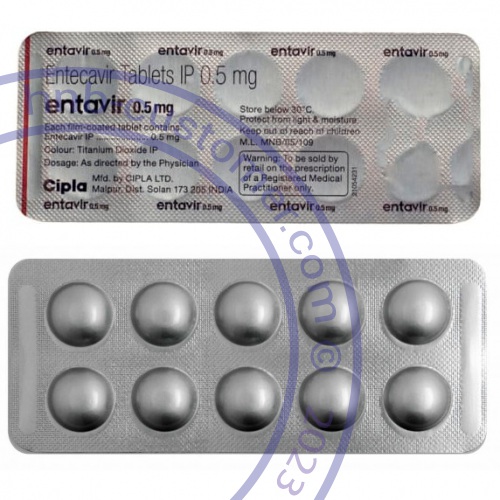

Brand(s):
- Entavir
Manufacturer:
- Cipla
Disease(s):
- Chronic Hepatitis B
- We can ship our products to any location worldwide
- Enjoy complete anonymity and robust data security measures
- Exclusive certified products at compelling prices
- Skip the hassle of long queues; get your medicines hassle-free
Baraclude
entecavire


Brand(s):
- Entavir
Manufacturer:
- Cipla
Disease(s):
- Chronic Hepatitis B
Entecavir Tablets
What is Entecavir?
Entecavir is an antiviral medication specifically designed to combat chronic hepatitis B virus (HBV) infection. It's approved for use in adults and children aged 2 years or older weighing at least 22 pounds (10 kilograms). It's crucial to understand that entecavir isn't a cure for hepatitis B; it manages the infection. The long-term effects of entecavir on preventing cirrhosis or liver cancer are currently unknown.
Warnings: Potential Risks
Entecavir is not suitable for everyone. Individuals with untreated HIV (human immunodeficiency virus) should avoid taking entecavir. A serious side effect is the possibility of developing lactic acidosis, a dangerous buildup of lactic acid in the bloodstream. This condition requires immediate medical attention. Symptoms include unusual muscle pain, breathing difficulties, stomach pain, dizziness, feeling cold, and extreme weakness or fatigue.
Stopping entecavir can potentially reactivate or worsen hepatitis B. Regular liver function tests are often recommended for several months following treatment cessation.
Before Taking Entecavir: Important Considerations
Entecavir is contraindicated for individuals with allergies to the medication or those with untreated HIV. HIV testing may be necessary before starting entecavir treatment. Using entecavir alongside chronic hepatitis B medications can increase the risk of HIV resistance to certain treatments.
Inform your doctor about your medical history, particularly if you have:
- HIV or AIDS (or previous exposure to HIV)
- Kidney disease
- Liver problems other than HBV
- Undergone a liver transplant
- Current use of lamivudine (Epivir, Epzicom, Trizivir) or telbivudine (Tyzeka)
A complete history of past hepatitis B treatments is essential. Entecavir might not be the appropriate choice if specific medications have been used previously. The risk of lactic acidosis increases with factors such as being overweight, long-term antiviral medication use, and female gender. Discuss this risk with your physician. Pregnant or breastfeeding individuals should also consult their doctor before initiating entecavir treatment. Pregnancy registries may track the effects of entecavir on babies.
How to Take Entecavir: Dosage and Administration
Always adhere to your prescription label and the provided medication guide. Take entecavir on an empty stomach, at least two hours before or after meals. Liquid medication should be measured precisely using the provided dosing syringe, not a kitchen spoon. Dosage adjustments may be needed based on weight changes, especially in children and teenagers.
Consistent use of entecavir is key to maximizing its benefits and preventing disease worsening. Report any persistent or worsening hepatitis symptoms to your doctor immediately. Never alter your dosage or schedule without consulting your doctor. Ongoing medical supervision is essential for individuals with HBV.
Store entecavir at room temperature, protecting it from moisture, heat, and light. Keep the bottle tightly closed. Discard any unused liquid entecavir after the expiration date.
It's important to be aware that hepatitis B can reactivate or worsen in the months following entecavir discontinuation. Regular liver function tests are generally recommended during and after treatment.
What to Avoid While Taking Entecavir
Entecavir does not prevent the spread of HBV. Safe sex practices and avoiding sharing personal items like razors and toothbrushes are crucial. Discuss safe sex practices with your doctor to minimize HBV transmission risk. Never share needles.
Entecavir Side Effects: Potential Adverse Reactions
Seek immediate medical attention for signs of an allergic reaction, including hives, difficulty breathing, and facial, lip, tongue, or throat swelling. Lactic acidosis, a potentially fatal condition, can occur. Even mild symptoms like unusual muscle pain, feeling cold, breathing difficulties, dizziness, lightheadedness, fatigue, weakness, stomach pain, vomiting, or rapid/irregular heartbeats require urgent medical attention.
Severe liver symptoms may also appear. Contact your doctor promptly if you experience midsection swelling, nausea, stomach pain, appetite loss, dark urine, clay-colored stools, or jaundice (yellowing of the skin or eyes).
Common side effects include:
- Nausea
- Dizziness
- Fatigue
- Headache
This list doesn't encompass all potential side effects.
Drug Interactions: Medications to Discuss
Other medications, including over-the-counter drugs, vitamins, and herbal supplements, can interact with entecavir. Always inform your doctor about all current and new medications.










